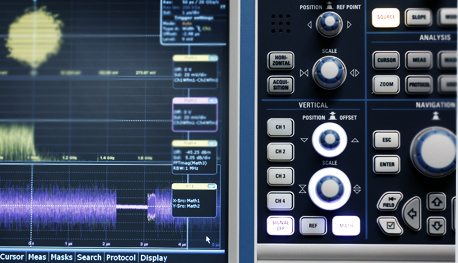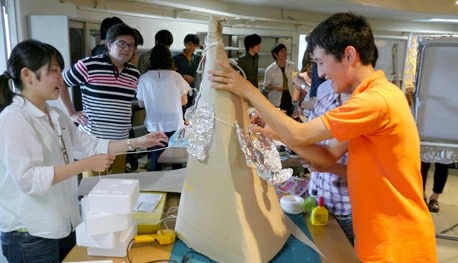Education
Information and Communications EngineeringCurriculum
Specialized education built on a broad foundation
— a solid footing for researchers and engineers
Students' first-year studies include mathematics, and information-related courses. Building on this foundation, students go on to take restricted electives at the 200- and 300-levels that cover subjects essential to all areas of the discipline.
There are electives available in the third year so that students may study in more depth the subjects taught in the first two years. Electives are available in the following course categories: Communications, Network, and Security; Foundational Mathematics; Signal Processing; Integrated Circuits and Computers; and Human-Centric Information Systems.
Programming and Laboratory Courses are compulsory and help develop a solid understanding of what was taught in classrooms.
Finally, the Independent Research Project provides students with the opportunity to conduct their own research, thus enabling them to deepen their understanding of the discipline and broaden their perspective, as well as develop their applied and creative skills.
-
1st Year
- 100-Level Courses
-
Students in their first year of undergraduate studies receive basic education that centers on Institute-wide compulsory courses regardless of their discipline. The 100-level courses are designed to teach common, basic skills required of science and technology students. The aims of these courses are to provide knowledge and cultivate the versatile intellect necessary for studying at the Institute.
-
2nd Year
3rd Year- 200-Level and 300-Level Courses
-
Students who complete their 100-level courses advance to study their undergraduate major. Courses at the 200- and 300-levels specific to the Information and Communications Engineering Major are taken in accordance with the curriculum.
-
- Communications, Networks, and Security Courses
- Through these courses, students study such topics as transmission technology and limits of transmission speed and data compression that form the basis of information and communication networks. Students also learn how to configure and control these networks. Furthermore, they get to study technologies necessary to safely and accurately distribute data (such as audio-visual content) using error correction codes and security technologies.
-
- Foundational Mathematics Courses
- Through these courses, students learn techniques heavily used in information and communications engineering, such as probabilistic and statistical methods as well as design and analysis of algorithms. Methods to efficiently process data using computers, optmization techniques, and numerical techniques are also covered.
-
- Signal Processing Courses
- Through these courses, students study the following topics: Fourier-Laplace analysis that forms the basis of signal processing and system analysis; basic theories and design theories for performing signal processing operations using digital processing; functional analysis that provides a unified mathematical perspective for signal processing problems and its application to inverse problems; basic methods of statistical parameter estimation such as least squares estimation and maximum likelihood method; basic methods of machine learning to extract useful information from complex data.
-
- Integrated Circuits and Computers Courses
- Based on circuit theories that deal with continuous-time signals, students learn methods used in logic circuit synthesis and computer design. They then go on to study the design of integrated circuits and computers with application constraints.
-
- Human-Centric Information Systems Courses
- Through these courses, students study human-centric information systems by looking at the sensory information processing mechanism of humans and learning about theories and intelligent algorithms for handling linguistic information and inference using computers.
-
- Laboratory, Programming, and Research Opportunity Courses
- In laboratory and programming courses, students obtain a deeper understanding of the theories and techniques covered in lectures.
Furthermore, in the Research Opportunity Course, students are required to consider the practical usage of these theories and techniques. Students are tasked with formulating new theories and creating new techniques fused with existing theories and techniques.
-
-
4th Year
- 200-Level and 300-Level Courses
-
At the final stage of the 300-level is the Independent Research Project (equivalent to the Undergraduate Thesis Research that was in place previously). The project is intended to serve as a capstone for students to consolidate and reinforce all the skills acquired in their Information and Communications Engineering Major. Furthermore, they may choose to enroll in the Advanced Independent Research Project. The purpose of this course is to enhance students' interest in scientific and technological research that began with the Independent Research Project. The course provides students with the opportunity to actively engage in their interests by taking part in science- and technology-related activities.
* The timeline depicts a standard case where students complete their bachelor's degree program in four years.
-
Entrance Examination
Students need to pass an entrance exam to advance from a bachelor's to master's program. To advance from a master's to a doctoral program, students must pass an advancement assessment.
-
Graduate Majors
Master's Program
Doctoral Program- 400-Level, 500-Level, and 600-Level Courses
-
Students who complete the Information and Communications Engineering Undergraduate Major may continue to study the same discipline in more depth by taking the Information and Communications Engineering Graduate Major. There are also closely related interdisciplinary graduate majors — Engineering Sciences and Design, and Science and Technology for Health Care and Medicine — to which students may advance.
-
- Department that offers this graduate major
-
- Information and Communications Engineering
-
- Departments that offer this graduate major
-
- Mechanical Engineering/
- Systems and Control Engineering/
- Information and Communications Engineering/
- Industrial Engineering and Economics/
- Architecture and Building Engineering/
- Civil and Environmental Engineering/
- Transdisciplinary Science and Engineering
-
- Departments that offer this graduate major
-
- Mechanical Engineering/
- Systems and Control Engineering/
- Electrical and Electronic Engineering/
- Information and Communications Engineering/
- Materials Science and Engineering/
- Chemical Science and Engineering/
- Computer Science/
- Life Science and Technology/
- Innovation Science
-



